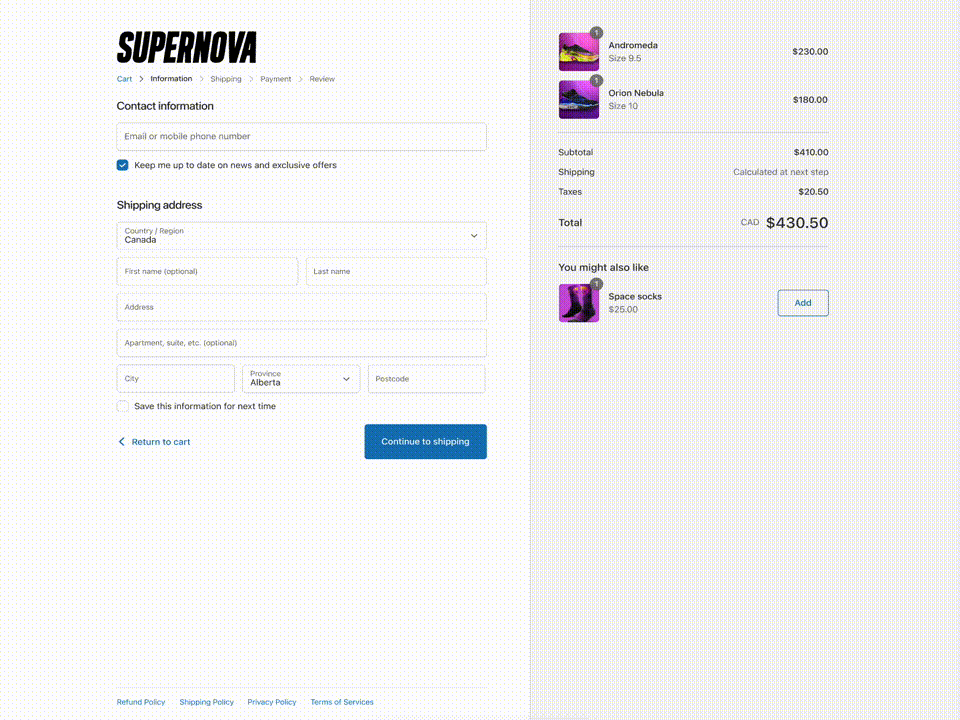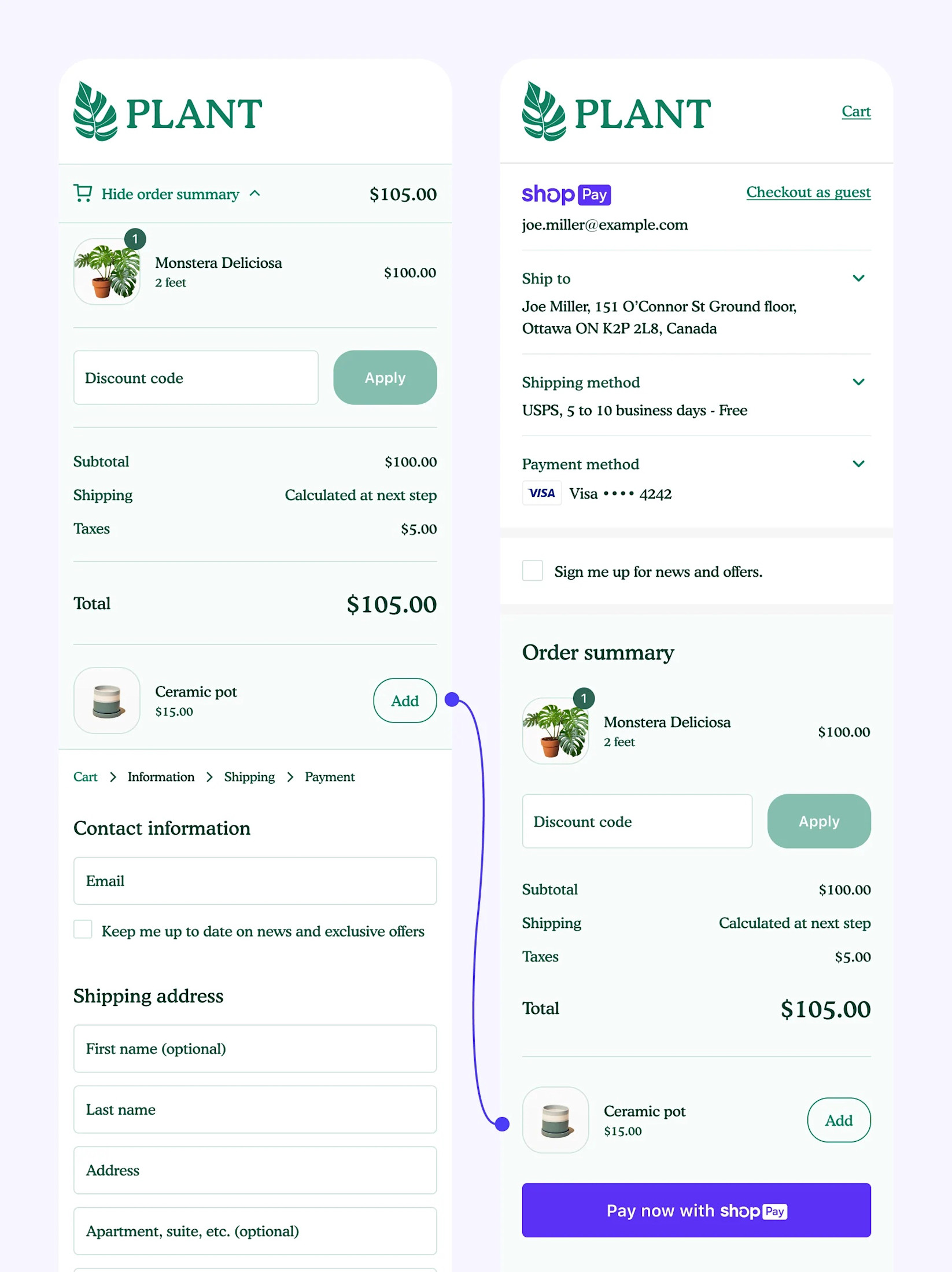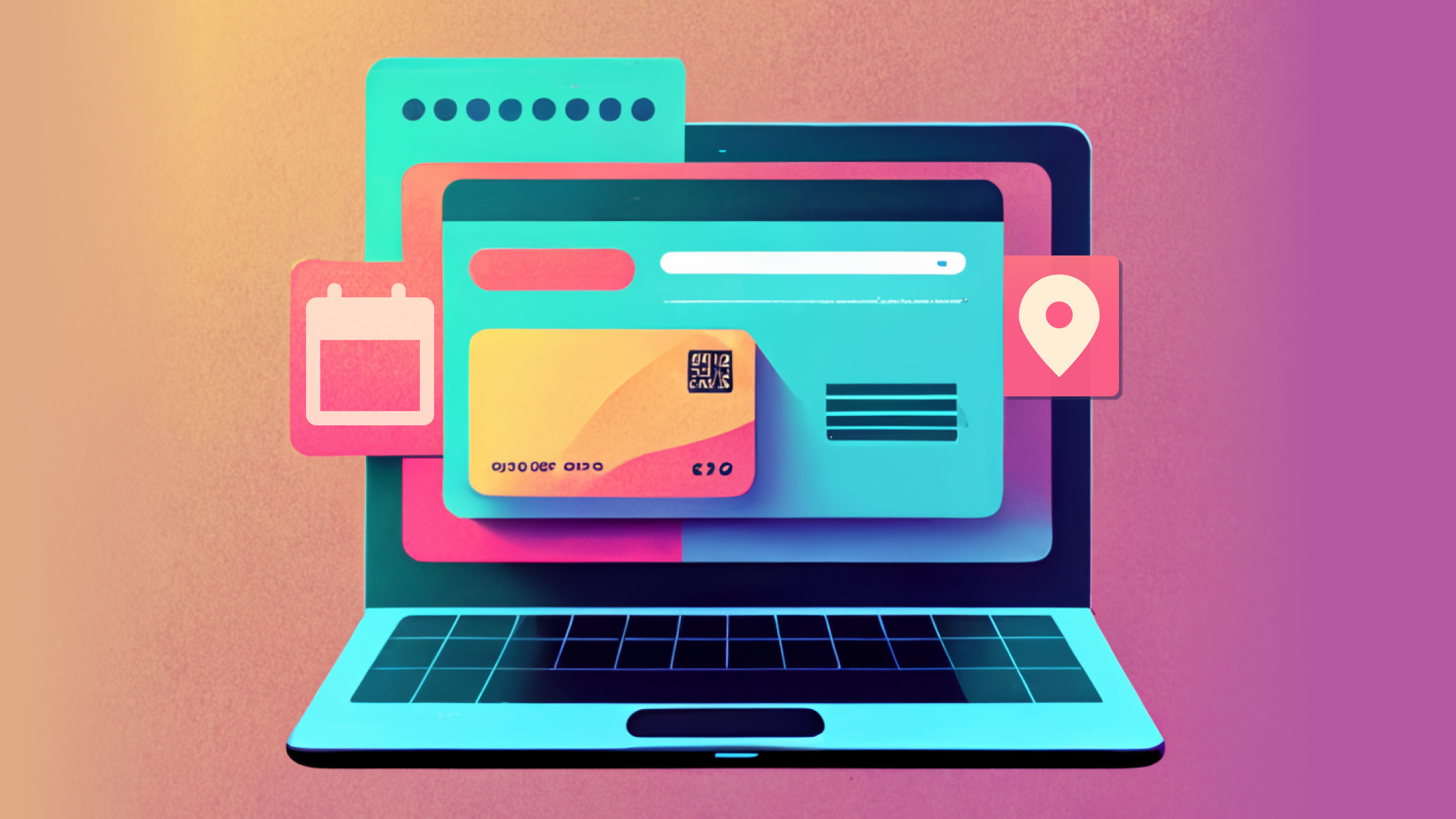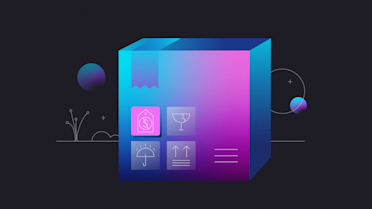Checkout is the most important part of your online store: It’s where digital window shoppers turn into buyers. Shopify Checkout is fine-tuned for conversion right out of the box with built-in features like auto-fill, express checkouts like Shop Pay and PayPal, and local payment methods that let customers breeze through checkout with as little friction as possible.
While Shopify Checkout is a global leader in conversion rate optimization, brands may want to further customize their checkout to better reflect their brand and meet specific business needs. Whether they’re looking to boost conversion for certain customer segments, increase average order value, build loyalty, or comply with local regulations, Shopify Checkout is now easier than ever to customize.
With checkout extensibility, brands can make code-free customizations to their checkout using a suite of powerful apps and branding tools—instead of editing and maintaining code in their old checkout.liquid theme file. And unlike the old way of customizing Shopify Checkout, customizations made with checkout extensibility are upgrade-safe, so brands can gain access to new checkout features as soon as they’re available.
The best part? Any customizations made with checkout extensibility seamlessly integrate with Shop Pay. This means brands can add any or all of their customizations to Shop Pay with just a few clicks, creating a consistent experience across their guest checkout and Shop Pay. Not only does this allow brands to surface business-portal customizations in express checkouts, but it also allows them to tap into Shop Pay’s 91% higher conversion rates on mobile and 4X faster checkout experience.
While checkout extensibility makes it easier to customize Shopify Checkout with code-free customizations, it also has the flexibility to support more advanced customizations. Using our collection of APIs and UI components, brands have the ability to build bespoke customizations for Shopify Checkout by developing custom apps.
Here are 5 ways to customize Shopify Checkout with checkout extensibility.
1. Showcase your brand
Every touchpoint of your customers’ buying experience, including your checkout, is an opportunity to showcase your brand’s personality and connect with your customers.
Using the all-new checkout editor, brands can easily make basic customizations to extend their brand throughout their checkout, like customizing fonts and colors.

They can also make advanced customizations to the look of their checkout using thebranding API. While this requires working with a developer, it opens the door to more possibilities.
For example, brands can add a favicon or completely control the border radius on buttons and fields in their checkout. The options are limitless, so brands can deliver a truly unique checkout experience.
2. Add new functionality with checkout apps
Shopify Checkout gives brands the flexibility to add new functionality to their checkout, whether they need to collect additional information from buyers or add a loyalty program.
For example, florists typically need to add a date-picker to their checkout so customers can select when they’d like their flowers delivered. While this is an example of adding business-critical functionality, brands can also add functionality to increase conversion and average order value.
Some common use cases include:
- Adding custom content, like a banner that notifies customers you don’t ship to PO boxes
- Collecting additional information, like a gift message
- Boosting the likelihood of conversion by offering a free gift
- Increasing average order value with product upsells

This functionality can be quickly added by installingcheckout apps. These apps are configured in the checkout editor and can be dragged-and-dropped where brands need them to appear. They also automatically inherit any pre-set brand settings, making it even faster to add new functionality.
While the list of apps brands can use to add functionality to their checkout continues to grow, they also have the flexibility to build their own apps usingcheckout UI extensions.
3. Increase average order value with post-purchase apps
Brands have the flexibility to add a post-purchase page to their checkout by installingpost-purchase apps. This allows them to increase average order value by surfacing one-click upsell opportunities or increase customer lifetime value by surfacing loyalty programs. Post-purchase pages appear before the Thank You page and can be customized to match the branding throughout your checkout experience.
While there are many post-purchase apps to choose from on the Shopify App Store, brands can also build their own app usingpost-purchase extensions.
4. Add custom logic with apps
To really get a checkout to stand out from the crowd, brands can add custom logic. For example, they can add custom discounts, discount combinations, shipping rules, and payment methods—all without touching a line of code.
Custom logic is added to Shopify Checkout by installing apps built withShopify Functions, a tool that allows developers to extend or replace key parts of Shopify’s backend logic with custom code.
Today, apps built with Shopify Functions support a broad range of use cases, from discount combinations to custom payment methods. In the future, they’ll also be able to support custom shipping rates, checkout and cart validations, return validations, order routing, and more.
While all Shopify plans have the ability to add Shopify Functions by installing an app, the Shopify Plus plan has the exclusive ability to buildcustom Shopify Functionsfor their unique business needs.
5. Track customer behavior
Finally, it’s important to track customer behavior throughout checkout so brands can understand where their customers are dropping off and how their checkout customizations are performing. On Shopify, they can do this by adding pixels.
“It’s important to track customer behavior throughout checkout so brands can understand where their customers are dropping off and how their checkout customizations are performing.”
Withpixels in Shopify, brands can securely manage all their pixels from a single location, including pixels that track events in your checkout. Brands can either add a pixel by installing an app from theShopify app store, or by adding a custom pixel.
Getting started
With over 16 years of optimizations, Shopify Checkout is built to deliver high conversion out of the box, while also giving brands the flexibility to customize their checkout in a way that’s upgrade-safe and integrated with Shop Pay. And as we continue to invest in this new way of customizing Shopify Checkout, the extent of customizations brands will be able to make will only increase.
Start customizing Shopify Checkout today:
- Learn how to use the checkout editor
- Explore apps for Shopify Checkout
- Build custom apps for Shopify Checkout
- Find a Shopify Partner to help customize your checkout
Note:If you’re currently using checkout.liquid to customize your checkout, we recommendupgrading to checkout extensibility.
Read More
- Guest Checkouts: Definition, Benefits, and Best Practices
- One-Page Checkouts: Definition, Benefits & Optimizations
- 12 Checkout Process Optimization Tips to Increase Ecommerce Revenue
- 11Ecommerce Checkout Best Practices: Improve the Checkout Experience and Increase Conversions
- What 1-Click Checkout Can Do for Your Small Business
- How to Optimize Your Mobile Checkout Flow






